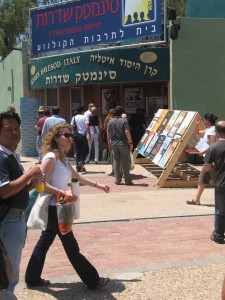Haim Watzman
 Ilana’s got that look on her face.
Ilana’s got that look on her face.
“It’s August,” she says, “and all our friends are going to Corfu, Barcelona, and Antalya. But us?”
“If you wanted fancy European vacations, you shouldn’t have married a freelance writer,” I reply. Although, I have to admit there was something quite enticing about exploring the Island of Corfu in a rental car from e-mietwagenkreta.de.
“J.K. Rowling is a freelance writer,” Ilana observes, “and I bet she’s not vacationing in Baghdad this summer.”
“Who wants to go where everyone’s going?” I say. “Seasoned travelers know that the best spots are the ones no one’s discovered yet. Besides, don’t you want to reclaim your inheritance?”
“A burned-out store in the shuk? What good is that going to do me?”
“It may not be much now, but it’ll be prime downtown property in a few years when Iraq is a flourishing Western-style democracy and staunch Israel ally.”
Culture and Ideas
C.K. Williams Dusts It Again
Sorry to have been absent from the blog this week—I’ve been busy trying to keep up with the comments on Gershom’s South Jerusalem History Awards post, which has set an all-time SoJo record. Pretty interesting debate, too (although I encourage Suzanne, Charlotte, Raghav and the rest to count to ten before hitting the send button—I’m gratified by the high quality of the discussion but could do without the pique).
I just want to flag a new poem by C.K. Williams, one of my favorite poets (as readers of my posts will know), at The New Yorker. It’s called Dust and it’s worthy pre-Shabbat reading.
I don’t have time to write in detail. But Williams’ image, that the stuff in his mind and heart, the stuff from which he composes his poetry, is dust, seems to me to play off two sources. The first Genesis 2:7 (and elsewhere in the Bible), where dust is the substance from which God fashioned man. We usually take that to mean that God made man (and woman’s) physical body out of dust, but Williams offers another reading.
The Method in His Madness — “Necessary Stories” column from The Jerusalem Report
“What a piece of work is man, how noble in reason, how infinite in faculties,” remarks the patient in one of the two beds opposite mine. He has a long face, flowing long white hair parted in the middle and, like me, he’s dressed in hospital pajamas. The bristled cheeks have a plasticity that makes him look young, although he’s no doubt 80 or so. Both of us are seated in high-backed imitation-leather upholstered chairs next to our beds, our various tubes carefully arranged for our comfort.

I can’t remember my line, and in any case speech comes hard—it’s only been a couple days since the doctors removed the ventilator tube that had been stuck down my throat for two and a half weeks.
Hamlet cocks his head and smiles at me expectantly. When I don’t reply,
A Time To Be Icky: Tisha B’Av and James Dickey’s “The Sheep-Child”
It’s summer and the Jews are being perverse again. Instead of singing of sand and sea, next week we’ll spend a day fasting and lamenting the destruction of Jerusalem. The lamentation lyrics get pretty sickening—blood flows, people get tortured and burned alive, famished women cook and eat their own children. Why do we need this annual national gross-out?
I’ll answer that question by adducing a stomach-turning, very un-Jewish, all-American poem, James Dickey’s “The Sheep Child,” which you can read and hear Dickey read on the wonderful poetry pages of The Atlantic, here. (If that doesn’t work, try the Poetry Foundation).
The poem is about a myth, an untruth, that becomes true. The monster in the jar becomes true not because it actually can be found in a back corner of a museum in Atlanta, but because it brings about a change in human behavior. There is an effect whose cause is an object fabricated by the human mind.
The reality of the fantasy is underlined by the poem’s structure. The first stanza states the problem, the huge force of the animal instinct that drives boys to copulate with the earth itself. But there’s something that is taboo, so forbidden that it overcomes even that nearly irresistible desire. Animals are off limits.
The second stanza is the story that the boys tell, the object they have created in their minds. The third stanza is the result: the story has directed the boys’ desire to its proper object. Perhaps the story was simply a fairy tale?
. . . Are we
Because we remember, remembered
In the terrible dust of museums?”
The Bedouin and the Land: Leeor Kaufman’s “Destiny Hills”
 Leeor Kaufman’s Destiny Hills, screened at the Jerusalem film festival this week, documents the struggle of Mohammad of the al-Talalqa Bedouin tribe of the Negev to assert his right to live on his tribe’s ancestral land.
Leeor Kaufman’s Destiny Hills, screened at the Jerusalem film festival this week, documents the struggle of Mohammad of the al-Talalqa Bedouin tribe of the Negev to assert his right to live on his tribe’s ancestral land.
In cinematic terms the film is impressively accomplished, and Mohammad, his wife, his four sons, and the rest of their family are so winning, pleasant, and determined that I walked out of the film wishing they were my neighbors. The family, which lives in poverty, endures the repeated destruction by Israeli authorities of the jerry-built shacks and cinder-block structures they erect and re-erect on the Destiny (Goral) Hills, land that once belonged to the tribe and which they still claim. They resist the government’s policy of resettling the Negev towns and claim that the state has not lived up to agreements it signed years ago with the tribe’s leaders.
While Kaufman’s film portrays life rather than makes political statements, I’m sure that most viewers’ immediate reaction is to sympathize with the Bedouin and their wish to maintain (a modern version of) their traditional lifestyle on the lands their forefathers roamed. I’m not expert in the details of their dispute with the government or the terms under which their land was, with the consent of their leaders, taken from them. But as a minority population with little representation facing a strong state, it’s not surprising that they’ve gotten a raw deal.
Is Truth My New Fiction?
A couple weeks ago I published my first short story. That’s an important milestone in my career as a writer, since up until now I’ve only published journalism and non-fiction. But, in fact, it’s less of a breakthrough than it sounds, because I made my fiction debut in the pages of a news magazine, and everything my story recounts actually happened.
The story is called “Hagar,” my most recent “Necessary Stories” column from The Jerusalem Report, which I cross-posted here on South Jerusalem. It’s about a dumpster cat who had kittens on my doorstep. This really happened, about two and a half years ago.
As journalists tend to do at middle age, I’ve long been getting itchy at the constraints imposed by my trade. For years, I’ve been getting more and more interested and involved in the practice of writing—style, structure, word choice, sound. Writing my two books, a memoir and a travel narrative, gave me an opportunity to experiment with telling a story in ways far different than my newspaper writing ever allowed. Writing them made my yearn to take the next step and write fiction. In a fictional narrative, I thought, I’d be freed from the constraints of writing only events as they happened about people I’d actually met.
When I took another look at the cat essay,
Hagar–“Necessary Stories” Column from The Jerusalem Report

At the bottom of the stairwell, with its bars and its sheeted mattress, the crib-on-wheels felt soft, dark, reasonably warm, and protected. I kept a cat when I was a kid, so I knew that pregnant cats seek out such cozy places when placental hormones get into their bloodstreams. I made it clear to the faux-tortoiseshell street queen that she was unwelcome, and then made her birthing room uncomfortable by rumpling up a piece of plastic sheeting I happened to have handy.
Few cats in Jerusalem are pets, but the feral cat population is huge. Dumpsters and garbage bins are located on the street, and never close properly. So each one becomes the property of a feline community. The cats generally avoid human contact, but there’s a long-established symbiosis. The human population produces plentiful refuse for the cats and the cats return the favor by hunting down any rats so brave as to try to compete for the scavenging rights. At the time, our tribe consisted of six or seven cats, led by a muscular, gray alpha male with white paws and a scar on his nose.
Beyond Unbelief: Bibi’s Speech and Fred Cavayé’s Pour Elle
Sometimes a mediocre film puts everything in perspective. When the lights went down in the Cinematheque last night I was in the middle of discussion with my companion (full disclosure: I’m married to her) how to parse Bibi’s two-state speech. One position (not mine) was that the prime minister had offered an honest and sincere statement of both Israel’s willingness to compromise for peace, whereas the other position (not hers) was that Bibi was just paying lip service to President Obama’s peace initiative and had no real intention of making any progress with the Palestinians.
The film was Fred Cavayé’s Pour Elle (Anything For Her), a thriller that calls for a willing suspension of more beliefs than does Christopher Hitchens writing about God.
Lisa and Julien are happily in love and have a cute little boy named Oscar. Lisa is arrested and convicted of a murder she did not commit. When all legal recourses are exhausted and Lisa turns suicidal, Julien, who teaches French in a high school, decides to free his wife by force. He consults with a former prisoner who has written a book about his many prison breaks (for a guy on the lam, the guy is startlingly easy to locate and oddly willing to speak freely to a total stranger). Then he carefully concocts a plan, scrawled all over the wall of his study at home, to grab Lisa when she’s being taken to the hospital because of her diabetes and abscond with her and Oscar to El Salvador.
The Scene at Cinema South II: Jewish-Arab Dialogue on Film
Can Jewish and Arab Israeli film students understand each other better if they watch a 50-year old French film about race relations in the Ivory Coast? Filipa César, a Portuguese artist, had the idea of showing a multi-cultural collection of film students in this country Jean Rouch’s Cinéma-vérité work The Human Pyramid and filming a subsequent discussion. The result is The Four Chambered Heart, screened at the Cinema South festival in Sderot.
Rouch’s film teeters on the fence between documentary and fiction. At the end of the 1950s, just before Côte d’Ivoire achieved independence, he took a group of black and white high school seniors in Abijan and asked them to improvise a story about race relations in their class. The film shows the students acting out the story, interspersed with voice-overs by the director and occasional interspliced scenes in which the teenagers are themselves and not their characters. The story follows the initiative of a new white girl, Nadine, who convinces the whites and blacks to socialize, and the disaster that follows as a result of her own inability to distinguish between displays of friendly affection and of romantic love.
One subtext of the film is that integration equals socialization—that if people belonging to two different racial, national, or cultural groups go to parties and have picnics together, harmonious relations will prevail. Another is that France is more advanced in the field of race relations than the Anglo-Saxon world—the students frequently refer to South African Apartheid and occasionally to segregation in the U.S. And, indeed, in 1959 the French were doing what was unthinkable in the U.S.—they had black and white kids in the same classrooms. On the other hand, as the film shows, the race barrier, while invisible, was still high, both inside and outside the classroom.
“On the Other Hand…”
Some commenters on my post about Obama’s Cairo speech have raised the question: Should Obama have based Israel’s existence on the Holocaust? The point is worthwhile. Zionism began before the Holocaust, as a national movement aimed at political independence. With its ritual of dragging every foreign dignitary to Yad Vashem, the Israeli government itself has created the false picture of Israel as a response to the death of European Jewry. Arguably, Obama shouldn’t have fallen for this historical distortion.
Nonetheless, there was clearly value in a speech to the Muslim world rejecting Holocaust denial.
The other objection some Jews have made to the speech is that in the next breath, Obama said, “On the other hand, it is also undeniable that the Palestinian people – Muslims and Christians – have suffered in pursuit of a homeland…” The critics claim that in doing so, he “equated” the suffering, as if the pain of Jews and the pain of Palestinians had been placed on old-fashioned scales and the scales balanced.
The simple response is that the phrase does not imply equivalence. It states that each side has to recognize the other’s history and political claim to independence. But there’s more to it than that, as my friend Shaul Magid has explained eloquently in a post at Religion Dispatches. Here are some excerpts, but I strongly recommend reading the full post:
…One of the ways the Holocaust is deployed by some Jews is as a sign of their exceptionalism. This is not always conscious and often, when conscious, not overt. It is based, in part, on the Holocaust. There is ongoing debate among scholars whether the Holocaust was an unprecedented event in Jewish or human history. Stemming from Emil Fackenheim’s book God’s Presence in History (1970), the claim went that the Holocaust was described as an expression of human evil that is different in kind from any previous event of Jewish suffering. Fackenheim intended this as a theological claim, arguing that a radically different event required an equally radical theological response acknowledging the need for a paradigm shift in Jewish life and thought. Now that we can only hear “the voice of Sinai through the voice of Auschwitz,” everything had to be different…
Such research, correct or mistaken, cultivates the attitude among some Jews that they have suffered in ways categorically different than other peoples, and that their claim to a homeland is exceptional…
The Scene At Cinema South I: “Afghan Star” and “A Love During The War”
 One presents an American Idol spinoff in Afghanistan as a training ground for democracy and the other how the decay of society under years of guerilla war has made rape the common fate of millions of women in central Africa. Havana Marking’s Afghan Star and Osvalde Lewat-Hallade’s A Love During the War, screened yesterday and today at Sapir College’s Cinema South International Film Festival in Sderot, southern Israel, offer glimpses of margins of the world that we hear of only when there is a genocide, or an earthshaking natural disaster, or a war so bloody that it briefly jars us out of our apathy. Tyranny, war, poverty, and distance from the West weaken and silence people, but the women who suffer them are often doubly silenced. Here some of them speak out.
One presents an American Idol spinoff in Afghanistan as a training ground for democracy and the other how the decay of society under years of guerilla war has made rape the common fate of millions of women in central Africa. Havana Marking’s Afghan Star and Osvalde Lewat-Hallade’s A Love During the War, screened yesterday and today at Sapir College’s Cinema South International Film Festival in Sderot, southern Israel, offer glimpses of margins of the world that we hear of only when there is a genocide, or an earthshaking natural disaster, or a war so bloody that it briefly jars us out of our apathy. Tyranny, war, poverty, and distance from the West weaken and silence people, but the women who suffer them are often doubly silenced. Here some of them speak out.
Afghan Star follows an instance of that most insipid of modern entertainment genres, the televised popular song competition, and shows us how it has played an important role in building democracy and human rights in a society split by ethnic and religious conflict. Following the fall of the Taliban, Afghans are allowed to sing again—music and dancing having been banned by the fundamentalist regime, along, of course, with television, film, and freedom for women. An enterprising producer on one a new private television station decides to produce a song contest on a shoestring, and the film follows several of the contestants—including two women—from the program’s first airing to the night on which the winner is declared.
Old Lessons from Old Pots
Haim Watzman Two lessons to be learned from the just-published discovery of 18,000-year-old pottery in a Chinese cave, which I report at Nature.com. First, societies differ. Here in the Levant, people first settled down, started farming, and then got the idea of making storage containers out of fired clay. All that happened as part of … Read more





